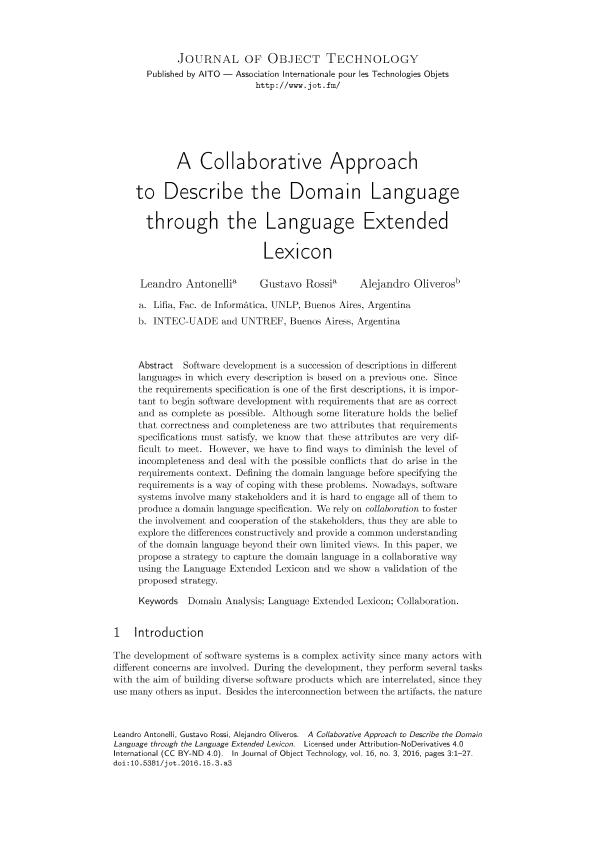Mostrar el registro sencillo del ítem
dc.contributor.author
Antonelli, Leandro
dc.contributor.author
Rossi, Gustavo Héctor

dc.contributor.author
Oliveros, Alejandro

dc.date.available
2019-06-12T20:36:04Z
dc.date.issued
2016-06
dc.identifier.citation
Antonelli, Leandro; Rossi, Gustavo Héctor; Oliveros, Alejandro; A collaborative approach to describe the domain language through the language extended lexicon; Association Internationale pour les Technologies Objets; Journal of Object Technology; 15; 3; 6-2016; 1-27
dc.identifier.issn
1660-1769
dc.identifier.uri
http://hdl.handle.net/11336/78146
dc.description.abstract
Software development is a succession of descriptions in different languages in which every description is based on a previous one. Since the requirements specification is one of the first descriptions, it is important to begin software development with requirements that are as correct and as complete as possible. Although some literature holds the belief that correctness and completeness are two attributes that requirements specifications must satisfy, we know that these attributes are very difficult to meet. However, we have to find ways to diminish the level of incompleteness and deal with the possible conflicts that do arise in the requirements context. Defining the domain language before specifying the requirements is a way of coping with these problems. Nowadays, software systems involve many stakeholders and it is hard to engage all of them to produce a domain language specification. We rely on collaboration to foster the involvement and cooperation of the stakeholders, thus they are able to explore the differences constructively and provide a common understanding of the domain language beyond their own limited views. In this paper, we propose a strategy to capture the domain language in a collaborative way using the Language Extended Lexicon and we show a validation of the proposed strategy.
dc.format
application/pdf
dc.language.iso
eng
dc.publisher
Association Internationale pour les Technologies Objets
dc.rights
info:eu-repo/semantics/openAccess
dc.rights.uri
https://creativecommons.org/licenses/by-nc-nd/2.5/ar/
dc.subject
Collaboration
dc.subject
Domain Analysis
dc.subject
Language Extended Lexicon
dc.subject.classification
Ciencias de la Computación

dc.subject.classification
Ciencias de la Computación e Información

dc.subject.classification
CIENCIAS NATURALES Y EXACTAS

dc.title
A collaborative approach to describe the domain language through the language extended lexicon
dc.type
info:eu-repo/semantics/article
dc.type
info:ar-repo/semantics/artículo
dc.type
info:eu-repo/semantics/publishedVersion
dc.date.updated
2019-05-23T19:11:42Z
dc.journal.volume
15
dc.journal.number
3
dc.journal.pagination
1-27
dc.journal.pais
Suiza

dc.journal.ciudad
Zurich
dc.description.fil
Fil: Antonelli, Leandro. Universidad Nacional de La Plata. Facultad de Informática. Laboratorio de Investigación y Formación en Informática Avanzada; Argentina
dc.description.fil
Fil: Rossi, Gustavo Héctor. Consejo Nacional de Investigaciones Científicas y Técnicas. Centro Científico Tecnológico Conicet - La Plata; Argentina. Universidad Nacional de La Plata. Facultad de Informática. Laboratorio de Investigación y Formación en Informática Avanzada; Argentina
dc.description.fil
Fil: Oliveros, Alejandro. Universidad Nacional de Tres de Febrero; Argentina. Universidad Argentina de la Empresa; Argentina
dc.journal.title
Journal of Object Technology
dc.relation.alternativeid
info:eu-repo/semantics/altIdentifier/url/http://www.jot.fm/contents/issue_2016_03/article3.html
dc.relation.alternativeid
info:eu-repo/semantics/altIdentifier/doi/http://dx.doi.org/10.5381/jot.2016.15.3.a3
Archivos asociados
